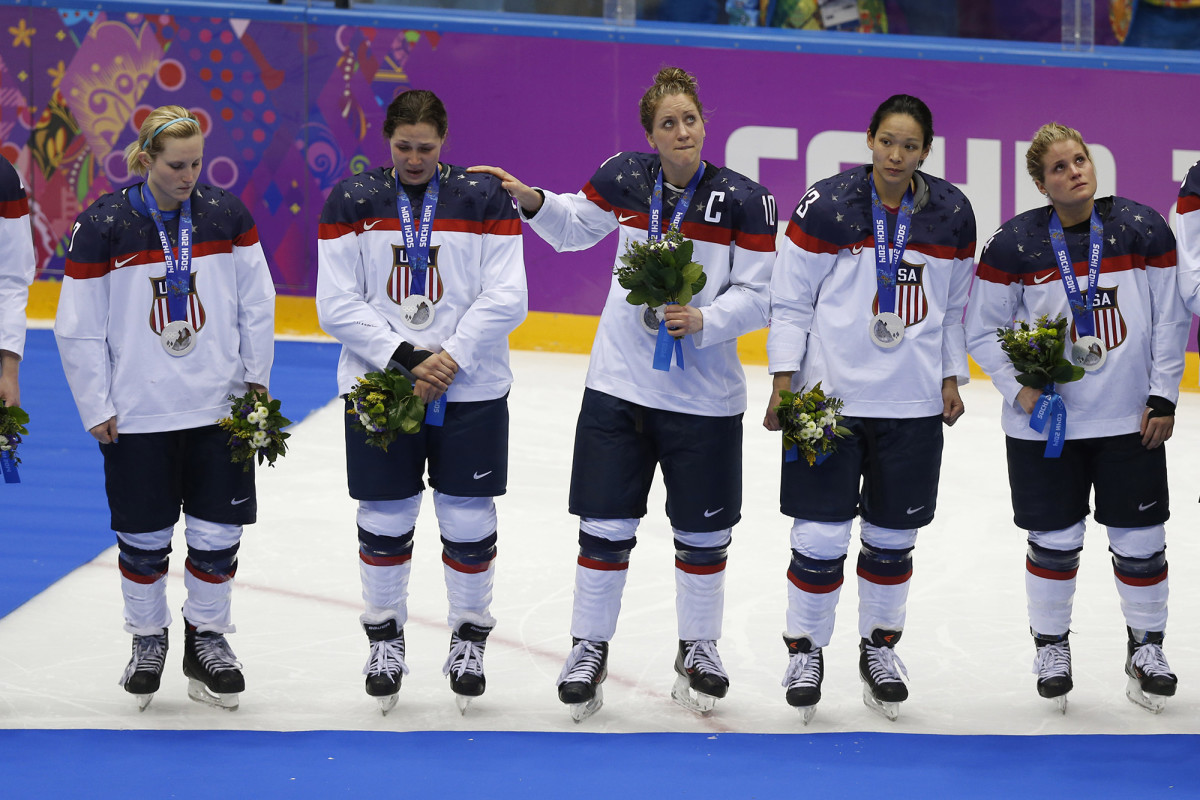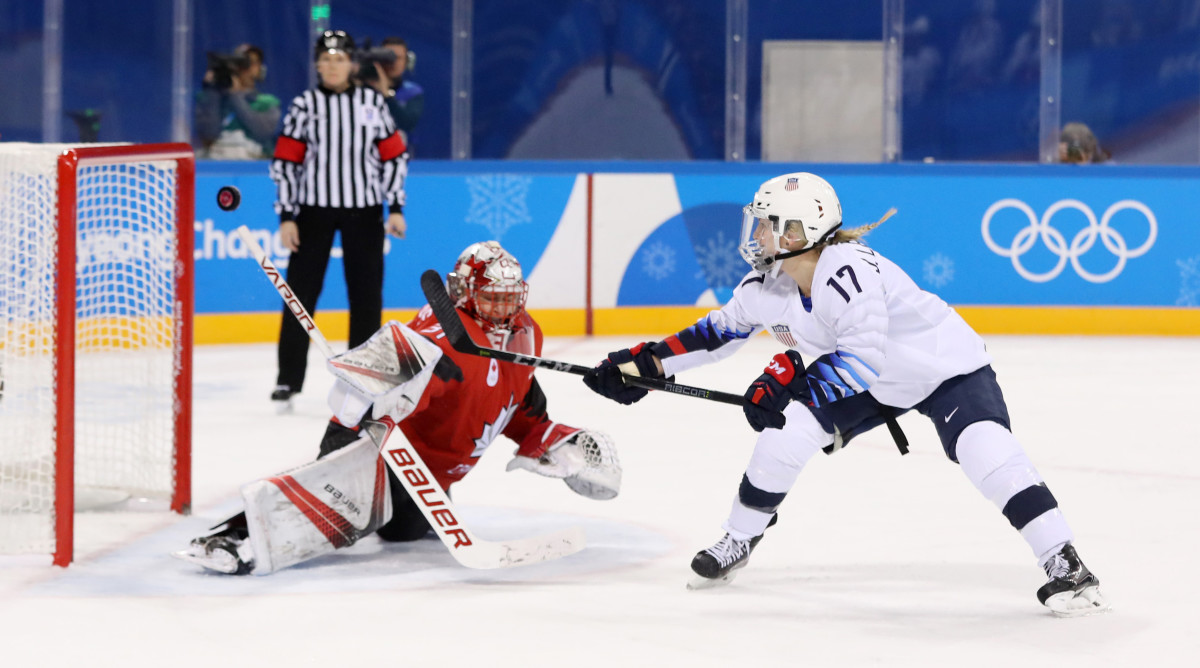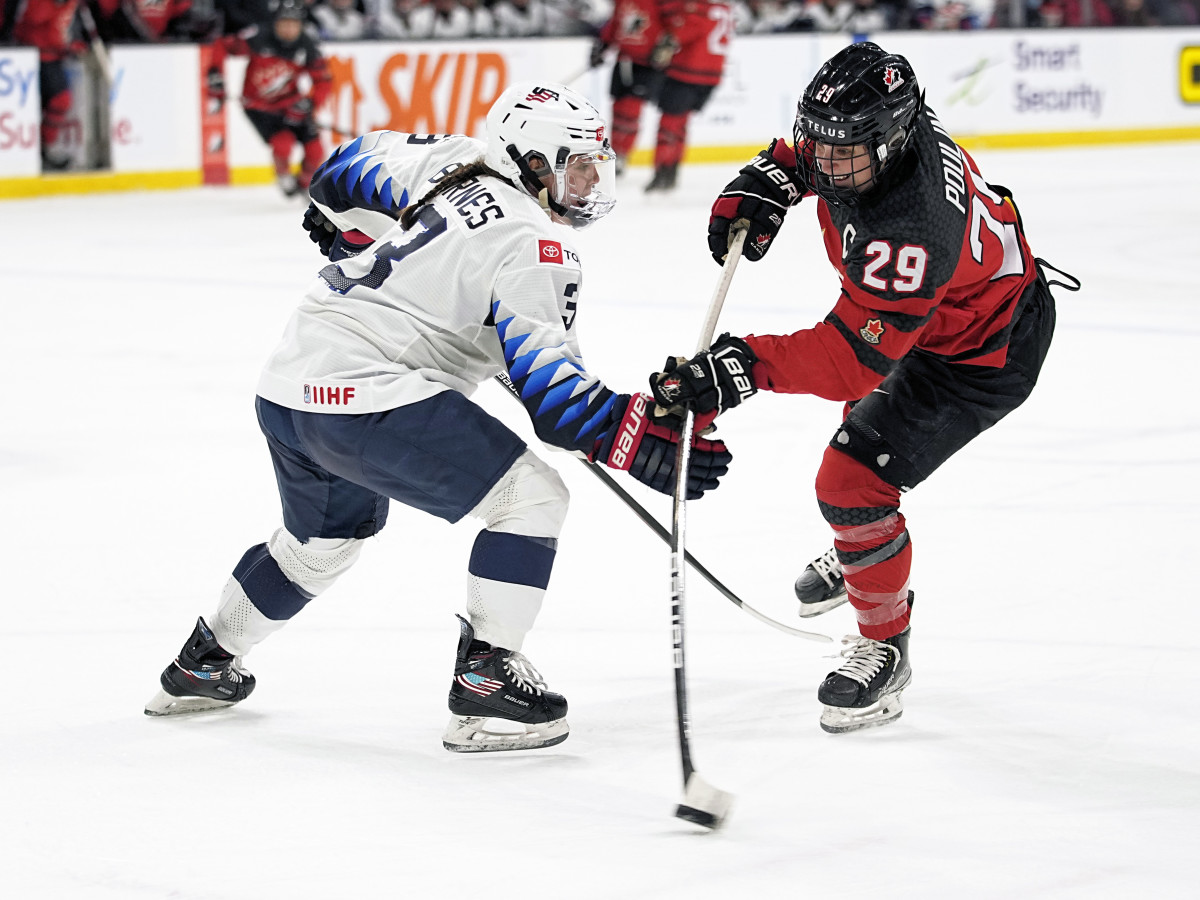For Married Pairs of Ex-Players, the U.S.–Canada Women’s Hockey Rivalry Is Uniquely Complicated
BEIJING — When the puck drops here Tuesday afternoon on the latest edition of the Winter Olympics’ fiercest rivalry, former United States captain Meghan Duggan will be parked behind a computer at her Connecticut home, cheering on the women’s hockey team alongside fellow alumni at a virtual watch party that she helped put together. Her wife will not be invited.
“We’ve talked about it,” Duggan says. “It’s going to be separate rooms, separate TVs, I think.”
Even in the wider sports world, few matchups contain the raw passion and tension that is conjured every quadrennial when the U.S. and Canada face off. Consider: The two sides have met in all but one of six Olympic women’s hockey finals since the sport was introduced in 1998; no other nation has captured gold. The 2014 final in Sochi went to overtime. The '18 final in PyeongChang required a shootout. And that is without mentioning the semi-annual IIHF world championships, where their average per-game goal differential over the past decade is a mere 1.6. “It’s heated,” three-time Olympic champion Gillian Apps says. “It’s amazing.”

For Duggan and Apps, though, this rivalry is far more complex than the ordinarily black-and-white calculus of this border battle. And they aren’t alone. In addition to them, two other married pairs of ex-American and Canadian players—Julie Chu and Caroline Ouellette and Kathleen Kauth and Jayna Hefford—have bridged the divide to build lives and families together away from the rink, proving once and for all that love is thicker than ice and vulcanized rubber.
“It’s not something that I would necessarily recommend for people to compete for an Olympic gold medal against the person that you’re dating,” Apps says. “But I think it says a lot for us to respect each other enough to know that we can handle something like that and that if we can get through something like that, then other challenges that come at us we can handle, too.”
Both forwards came up through the NCAA ranks—Apps at Dartmouth and Duggan at Wisconsin—and first linked up in summer 2013, introduced via mutual friends in the sport. But it wasn’t long before their relationship faced its biggest test to date when Apps and Canada edged out Duggan and the U.S. on current captain Marie-Philip Poulin’s sudden-death goal in Sochi. Naturally, Duggan was crushed, and the emotional burden took its toll on her partner. “I’m not going to sugarcoat it,” she says. “It was an incredibly challenging time for us.”
For Apps, then basking in the glow of a third straight gold, the key was giving Duggan space to grieve. “I didn’t know what it felt like to lose at the Olympics, and she’d never experienced what it felt like to win,” Apps says. “It was that respect, that professionalism of understanding that we’re in totally different worlds but together.” On the flip side, Duggan recognized the importance of allowing Apps to celebrate without worrying about how it was impacting her other half. “I think that’s what we needed, to just do our things with our teams,” she says.

Four years later, Duggan got her moment when the U.S. survived a late Canadian power play in overtime and Jocelyne Lamoureux-Davidson banked the winning shootout goal for a 3–2 win. Apps, who retired in September 2015, was busy with her business school studies at the time but flew to South Korea for a whirlwind 36 hours to support her wife. “Obviously it shows the type of person she is," Duggan says. “I think she wanted to stay by herself and watch the game.” Of course, any disappointment that Apps might’ve felt was dwarfed by the thrill of seeing Duggan with gold around her neck—and the knowledge that the heartbreak of Sochi was no longer off-limits. “She now can poke fun at me,” Duggan says. “I still don’t like it. But we’re adults.”
Like Apps and Duggan, Chu and Ouellette were swiping pucks from one another long before they stole each other’s hearts, both at the 2002 Olympics and in college. (The third, and oldest, U.S.-Canadian couple, Kauth and Hefford, declined an interview request for this story, citing personal privacy.) But it wasn’t until '05 that they became friends after working a hockey camp together in Ontario. “I was dating someone else,” Chu says. “But as our friendship grew, and I’d broken up with my previous girlfriend, we got a chance to have that evolve.”
They wound up dating through the next three Olympics, facing similar challenges as Apps and Duggan; the toughest came in Sochi, where a potential empty-netter that would’ve all but clinched American gold instead bonked off the post and paved the way for Poulin’s heroics. “That was really difficult,” Ouellette says. "We both knew it was our last Olympics. But we’ve always been there for one another. That’s why it’s worked out.” Indeed, two years later, Chu and Ouellette hoisted the CWHL’s Clarkson Cup as teammates on the Montreal Canadiennes, only a week or so after Ouellette learned she was pregnant with their daughter, Liv. Dozens of headlines followed declaring that the couple had restored people's faith in the power of love.
“We’ve experienced everything,” Ouellette says. “We’ve been together each hour of every day, and we’ve been apart for months. We’ve done a lot of those tests that are difficult for relationships, and we were ready for the hardest one—becoming parents.”

“From the outside, I’m sure people are like, ‘How is this even possible for any of the three couples?’” Chu adds. “But in a relationship, you want to connect with someone who you can relate to, who really understands what you're going through.”
Now the associate head coach and head coach at Montreal’s Concordia University, respectively, Ouellette and Chu are just as pleased that others understand what they’re going through, too. “When it did come out that we were together, I never expected the amount of support or the message of hope that it gave all kinds of people of different ages,” Ouellette says. “I have a tournament that I do every year, and [the players] see Julie and I, and they’re like, ‘These are their daughters!’ It restores faith that this next generation is going be more open and accepting, and we’re going to be more inclusive as a society.” The evidence is here in Beijing, where at least 35 out LGTBQ athletes are performing on winter sports’ biggest stage, more than double the figure from PyeongChang, according to Outsports. “It makes us very proud, thinking back about Sochi,” Ouellette says, “how it was completely the opposite and we were encouraged to remain silent because of the [Russian] government.”
Chu will have the house to herself for Tuesday’s USA-Canada tilt (11:10 p.m. ET), taking care of 4-year-old Liv and 21-month-old Tessa while Ouellette helps call the game in French for CBC television; not that either little one has developed a national allegiance just yet. “Our youngest, you can put whatever on her that you want,” Chu says. “Our oldest wants to be in Anna and Elsa dresses.”
Across the border, a fiercer competition is shaping up to take place. Apps plans to give Duggan ample space for her watch party: “Yeah, I probably won’t be attending,” she says. But, true to her Olympic background, she certainly isn’t going to back down when it comes to what George, 2, and Olivia, four months, will be wearing. “I’m sure it’ll be an exciting night in our household, each of us trying to claim the rights of our two kids,” Apps says. “Either they’re wearing a mix of both, whoever gets up with them first can get the appropriate jerseys.”
The good news? Even if Apps loses, there will always be another USA–Canada game.
